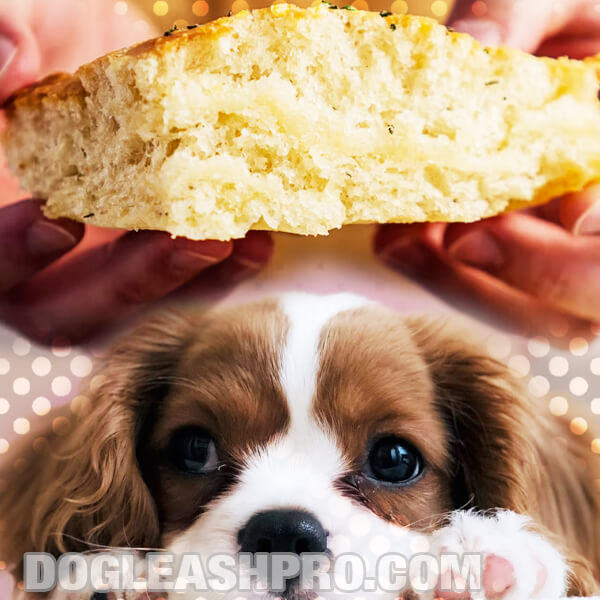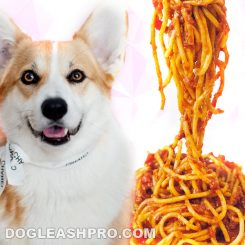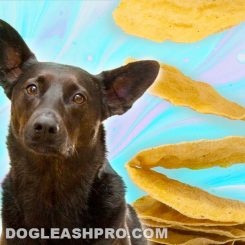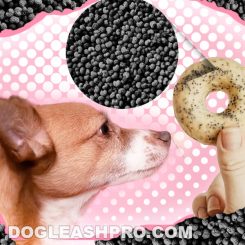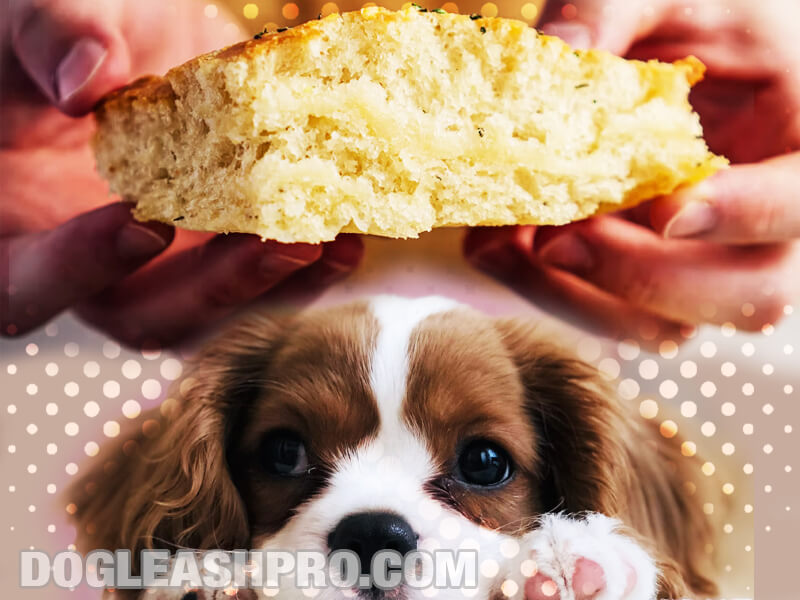
Can dogs eat Cornbread? Yes, dogs can eat Cornbread in moderation since it is. However, Cornbread is high in fat, calories, and carbs and it’s not for all dogs. Some of the ingredients in this buttery Cornbread may cause an upset stomach and digestive issues in dogs. If your dog is sensitive to wheat or corn, avoid feeding him Cornbread. Dogs that are lactose intolerant should also stay away from Cornbread.
As you’re cutting a slice of that freshly baked Cornbread and topping it with strawberry jam, your dog comes running into the kitchen. He could smell the buttery aroma in the air and he is now drooling. You’re tempted to give him a small piece, but wondered, “Can my dog eat Cornbread?”
In this article, we’ll discuss everything you need to know about dogs and Cornbread. We’ll go over when your dogs should not have Cornbread and why some of the ingredients in Cornbread may harm your dog’s health. Let’s get started!
Table of Contents
Can dogs have Cornbread?
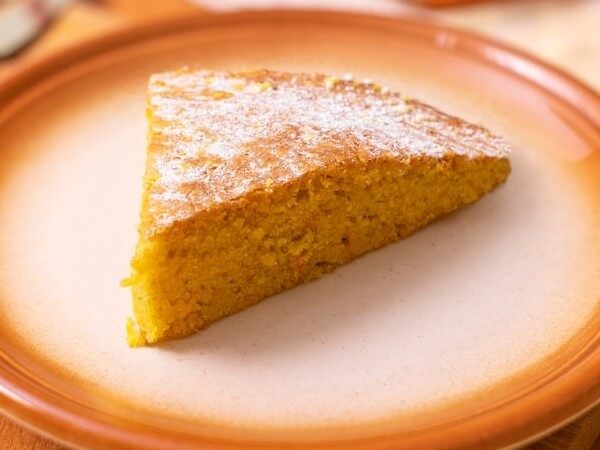
It depends, some dogs can have Cornbread while other dogs should stay away from it.
Let’s take a look at what Cornbread is and the ingredients in this comfort food to help you determine whether you can offer a small piece to your canine friends.
What is Cornbread?
As the name suggests, Cornbread contains some variation of “Corn,” specifically Cornmeal. This delicious food was originally a part of Native American cuisine and throughout the centuries, it became a popular dish in the Southern United States.
Many enjoy this as part of their meal, including breakfast, and it can also be served as a dessert or snack. Cornbread is not only delicious, but it is also versatile. You’ll find Cornbread served as a cake or muffin.
Let’s take a look at the ingredients in Cornbread and see why many love this comfort food all year round.
Cornbread ingredients
- All-purpose flour.
- Yellow cornmeal.
- Granulated or white sugar.
- Salt.
- Baking powder.
- Butter.
- Egg.
- Milk.
- Vegetable oil.
From the list of ingredients, we can already see how it is a favorite food for many. However, the same can not be said for our four-legged friends. Here’s why.
Is Cornbread bad for dogs?
Yes, Cornbread can be bad for dogs. If your dog has the following health issues, it’s best not to feed them Cornbread:
- Diabetic or pre-diabetic.
- On weight management program due to being overweight.
- Sensitive or allergic to corn, wheat, or gluten.
- Lactose-intolerant.
That’s because most of the ingredients in Cornbread are actually harmful to our dogs’ health especially if they have the above health conditions.
All-purpose flour in Cornbread is harmful to dogs with wheat allergies
To give the Cornbread its fluffy and firm texture, you’ll need to use all-purpose flour. However, all-purpose flour is a wheat product. Some dogs are sensitive to wheat and gluten. If they accidentally ate flour or wheat products, they may experience the following symptoms:
- Itchy and dry skin.
- Dry and poor coat.
- Excessively licking the paws and paw pads to the point that the paw pads become inflamed and red.
- Ear infections.
- Diarrhea.
- Intestine inflammation.
- Lethargy.
If you suspect your precious pooch has wheat allergies, we highly recommend that you reach out to your vet right away.
Wheat allergy isn’t something your dog is born with. Sometimes, wheat allergy can suddenly appear or it could appear after eating wheat products daily. If you’re not sure whether your furry friends have wheat or gluten allergy, consult your vet to find out.
It’s important to note that all-purpose flour is highly processed. It comes in two forms – bleached and unbleached. During the grinding and processing, the natural wheat grain is stripped of its natural nutrients.
The natural nutrients are found in the bran and in the germ. When these two are removed from the wheat grain during processing, you’re left with the endosperm, which is the starchy kernel.
While some minerals and vitamins are added back to the flour, there’s not much nutritional value in it that would benefit your dog’s health.
Plus, our canine friends can receive their necessary vitamins and minerals intake from their regular healthy, and well-balanced meals or from canine-friendly treats.
All-purpose flour is also not the best type of flour for dogs. If you’d like to make doggy treats with flour, consider Amaranth flour instead. Amaranth flour isn’t gluten or grain and it’s packed full of minerals, protein, and amino acids.
Other flours for doggy treats you can use are:
- Garbanzo bean flour.
- Brown rice flour.
- Almond flour.
- Coconut flour.
- Quinoa flour.
- Oat flour.
- Buckwheat flour.
- Whole grain wheat flour.
- Sorghum flour.
As we can see, if your dog has a wheat or gluten allergy, are sensitive to wheat or gluten, avoid feeding him Cornbread.
Yellow Cornmeal in Cornbread isn’t healthy for dogs
The next ingredient in Cornbread is yellow Cornmeal. Our canine friends should avoid Cornmeal at all costs.
You may be surprised to hear this since this is an ingredient found in many dog food.
And you’re right because according to a study done by Charles G. Aldrich, “Corn is included in many pet food recipes due to its structure-forming properties, economics, and history of nutritional utility. Dogs…can obtain glucose from dietary sugars or synthetize it from other substrates through a process called gluconeogenesis…A moderate intake of starch ingredients like corn adds energy to the diet, besides providing some fiber, protein, and fatty acids.”
However, we want to point out that just because many dog food contains Cornmeal, it doesn’t mean that Cornmeal is healthy for dogs.
In fact, many dog food manufacturers use Cornmeal for the sole purpose of it being a filler.
It’s important to note that our four-legged friends don’t need Corn in their daily diet. As a matter of fact, many dogs are not able to properly digest Corn and may get upset stomachs from eating it.
Most of the Cornmeal used today come from corn that has been mass-produced and is very low to poor quality. Since it’s mass-produced, it’s pretty cheap so many dog food manufacturers will use this ingredient since it is cost-effective and useful as a binding agent.
Cornmeal isn’t nutritious to dogs and eating it regularly or daily can negatively affect your dog’s health over the long run.
Some dogs may have allergic reactions to Cornmeal after constantly eating it or being exposed to it. They may develop symptoms such as:
- Ear infections.
- Itchy, dry, and flaky skin.
- Weight issues such as weight gain.
- Cough.
- Coarse and dry throat.
For these reasons, it’s best to avoid Cornmeal and Cornbread.
Granulated or white sugar in Cornbread can cause diabetes and weight gain in dogs
Most Cornbread calls for white sugar or granulated sugar as one of its ingredients. Granulated sugar is also known as regular white sugar. Sugar is added to keep the Cornbread cake or cupcake sweet, tasty, and delicious.
However, consuming a lot of sugar is harmful to your dog’s health. If your dog is pre-diabetic, do not feed him or her Cornbread.
If your dog ate a small piece of Cornbread as a rare occasional treat, that should be fine. But our four-legged friends should not eat Cornbread daily or regularly.
Regularly eating food that contains lots of sugar can cause a whole host of health issues in dogs.
First, your furry family member may have an upset stomach from eating too many sugary treats. He may start to have loose diarrhea or may vomit.
Second, sugar can affect your dog’s dental health and hygiene. When dogs eat sugary food, the sugar will get stuck on or between their teeth. The bacteria in the mouth will, unfortunately, use the sugar to produce acids. The acids will then break down the tooth’s enamel putting the tooth at risk of tooth decay. This causes dental disease in dogs.
Third, regularly eating sugary food can cause weight gain. When dogs gain weight, it starts to put stress on their joints and can cause joint pain and problems. When dogs continue to gain unnecessary weight, they may become obese and this can also cause breathing difficulty, lethargy, and even heart disease.
Fourth, let’s not forget that your dog’s metabolism will also be affected. There will be more fat storage in their body and they will lose their muscle tone. On top of that, they will have lower energy levels, a weaker immune system, and become lethargic.
Finally, consuming too much sugar can put your furry friends at risk for diabetes. They may develop Type II diabetes and this could lead to pancreatitis.
For these reasons, it’s best to keep sugary food and sugary snack like Cornbread away from your furry pooch.
Consuming a lot of Salt in Cornbread can cause sodium poisoning in dogs
If you’re planning on sharing your Cornbread with your canine family members, try not to add too much salt. When dogs consume too much salt, they are at risk of sodium poisoning.
Signs and symptoms of salt poisoning include:
- Extreme thirst.
- Swollen tongue and lips.
- Frequent urination.
- Loss of appetite.
- Vomiting.
- Nausea.
- Diarrhea.
- Convulsion.
- Difficulty breathing.
- Fever.
- Confusion.
- Headache.
- Tachycardia or increased heart rate.
- Lethargy.
- Muscle spasms and weakness.
- Upset stomach.
- Loss of coordination.
Handy Hint: You’ll want to keep the Dog Vomit Color Guide handy as it is extremely helpful, especially when your dog is not feeling well and is vomiting all over.
Butter and Milk in Cornbread are bad for dogs that are lactose intolerant
Dogs that are lactose intolerant will not be happy when they start to have explosive diarrhea, bloating, or flatulence right after eating Cornbread. You may also be annoyed with their constant and frequent passing of gas.
Most dogs are lactose intolerant. After they’ve weaned, they lose the lactase enzyme that’s responsible for digesting the lactose sugar found in milk. When this happens, they’re not able to digest dairy products like milk properly which is why they’ll have an upset stomach.
Other signs of lactose intolerance include vomiting and loss of appetite.
When it comes to butter, you may already know that there is a lot of fats in butter so it’s not wise to feed your pooch butter or food that contains butter.
If you know your dog is sensitive to dairy products like milk, avoid feeding him or her Cornbread that contains milk.
So does this mean all dogs should avoid Cornbread? Not necessarily. We’ll cover next when dogs can have Cornbread.
Is Cornbread good for dogs?
While Cornbread isn’t the best or healthiest food for dogs, having a small piece or amount every now and then won’t hurt your dog if they are generally healthy and do not have any health problems we’ve mentioned above.
Dogs And Cornbread
Can Dogs Eat Cornbread Muffins?
Dogs can eat Cornbread Muffins in moderation, but it’s not recommended as a regular treat.
While the primary ingredients in Cornbread are generally safe for dogs, some muffins may contain added sugars, salts, or other ingredients that aren’t ideal for canine consumption.
Always check the ingredients and consult with a veterinarian before introducing new foods to your pet’s diet.
Can dogs eat Corn Muffins?

Yes, dogs can eat Corn Muffins in moderation and only if they don’t have health issues like pre-existing diabetes, high blood sugar level, or are overweight. That’s because Corn Muffins are the same as Cornbread.
The ingredients used to make Corn Muffins are the same as Cornbread. It’s just that the Cornbread is shaped into a muffin when the batter is poured into a muffin pan.
Corn Muffins are indirectly harmful to dogs and like Cornbread, they’re not considered nutritious for our dogs.
For this reason, avoid feeding your pooch Cornbread regularly. An occasional rare treat should be fine.
Can Dogs Eat Jiffy Cornbread?
Yes, dogs can eat Jiffy Cornbread in moderation, but it’s not recommended as a regular treat.
Jiffy Cornbread is a famous brand of Cornbread mix that typically contains cornmeal, flour, and other ingredients.
While the essential components are generally safe for dogs, the mix might have added sugars, salts, or artificial additives that aren’t ideal for canine consumption.
Thus, it’s always best to check the ingredients and consult with a veterinarian before giving new foods to your K9 friends.
Can Dogs Eat Cornbread Dressing?
Dogs can eat cornbread dressing in small amounts, but it’s not recommended.
Cornbread dressing often contains ingredients such as onions, garlic, and certain spices, which are toxic to dogs.
Additionally, it can be high in salt and fats, which are not ideal for a dog’s diet. It’s always best to ensure any food given to your canine friends is free from potentially harmful ingredients and additives.
Can Dogs Eat Cornbread Stuffing?
Yes, dogs can eat Cornbread stuffing in moderation, but it’s not advisable as a regular treat.
Cornbread stuffing, also known as dressing in some regions, is a mixture of crumbled Cornbread, seasonings, and often ingredients like celery, onions, and broth.
While the Cornbread itself might be safe for dogs, the added seasonings, especially onions and certain herbs, can be toxic to them.
Always ensure the ingredients are safe and consult with a veterinarian before offering new foods to your furry friends.
Can Dogs Eat Cornbread With Honey?
Yes, dogs can eat Cornbread with honey in moderation, but it’s not recommended as a regular treat.
Honey is generally safe for dogs in small amounts, but excessive consumption can lead to an upset stomach.
Additionally, Cornbread might not be ideal for canine consumption, especially if made with added sugars and salts.
It’s always best to offer plain Cornbread without added sweeteners or flavors and consult a veterinarian before introducing new foods to your pet’s diet.
Can Dogs Eat Pinto Beans And Cornbread?
Yes, dogs can eat pinto beans and Cornbread in moderation. However, there are considerations to keep in mind.
Pinto beans with Cornbread is a staple in Southern and Southwestern U.S. cuisine. To learn more, check out the West Virginia Public Broadcasting’s A Taste Of Home — How Pinto Beans And Cornbread Became An Appalachian Tradition.
Pinto beans, often cooked into a savory stew or served as refried beans, are commonly paired with Cornbread as a hearty and complementary side.
The warm, slightly sweet Cornbread balances the earthy flavor of the beans. This pairing is especially popular in comfort meals and gatherings.
Pinto beans are a good source of protein and fiber, but they should be cooked thoroughly and served plain, without spices or seasonings. Some ingredients like onions or garlic can be toxic to dogs.
Similarly, Cornbread should be given without added sugars or salts.
It’s always best to consult with a veterinarian before introducing new foods to your pet’s diet.
Can dogs eat Cornmeal?
Yes, dogs can eat Cornmeal as it is not toxic to dogs, but it’s also not healthy for dogs either. In fact, some dogs may start to develop Cornmeal allergy after consuming it for years.
As discussed above, Cornmeal has been used in many dog food as a filler. However, dogs don’t need corn in their diet and some dogs have trouble digesting corn.
Can dogs eat Corn cakes?
No, dogs should not eat Corn cakes if the ingredients in Corn cakes contain green onions or scallion. All onions, no matter what color they are, are toxic to dogs. When dogs eat green onion or scallion, they are at risk of onion toxicity.
If the Corn cake does not contain green onions, then your dogs can have it in moderation as a rare occasional treat.
You might also like: Can Dogs Eat Cheesecake? The Sweet Truth!
So, can dogs eat Cornbread?
While Cornbread is not directly toxic or poisonous to dogs, it is harmful to dogs if consumed regularly or daily. Before you offer a piece or two of Cornbread to your furry friends, consider if the ingredients in the Cornbread are canine-friendly.
If you’re ever unsure of how your dog may react to certain types of food or ingredient, we highly recommend that you reach out to your vet. Your vet knows your dog the best and will know if your dog is allergic or sensitive to that food or ingredients in question.
DISCLAIMER: THIS WEBSITE DOES NOT PROVIDE MEDICAL ADVICE
The information, including but not limited to, text, graphics, images and other material contained on this website are for informational purposes only. No material on this site is intended to be a substitute for professional veterinary advice, diagnosis, or treatment. Always seek the advice of your veterinarian or other qualified health care provider with any questions you may have regarding dietary needs.
Resources:
https://en.wikipedia.org/wiki/Cornbread
https://pubmed.ncbi.nlm.nih.gov/7848179/

With over five years of specialized experience as an animal writer, my expertise lies in dog nutrition, health, behavior, grooming, and training. I am dedicated to delivering helpful and informative content that caters to the well-being of our furry friends. My primary goal is to empower pet owners with knowledge and ensure our canine companions thrive in health and happiness. In my free time, I love volunteering at local dog rescue centers.
